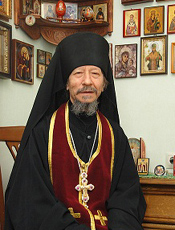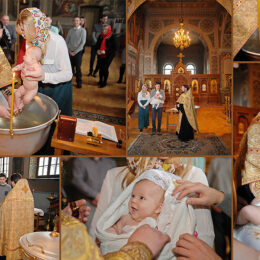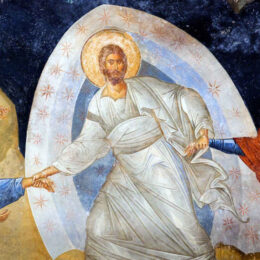
by Hieromonk Job Gumerov –
Man has given thought to the meaning and purpose of life since antiquity. The Greeks had the myth of Sisyphus, king of Ephyra (Corinth). As punishment for his deceitfulness, in the underworld he had to roll an enormous rock up a mountain for eternity. But as soon as he reached the peak, an invisible force propelled the rock back down to the bottom – and then the same pointless labor began all over again. This is a striking illustration of the meaninglessness of life.
In the twentieth century, the writer and philosopher Albert Camus applied this image to modern man, judging the central feature of his existence to be absurdity:
“At that subtle moment when man glances backward over his life, Sisyphus returning toward his rock, in that slight pivoting he contemplates that series of unrelated actions which become his fate, created by him, combined under his memory’s eye and soon sealed by his death. Thus, convinced of the wholly human origin of all that is human, a blind man eager to see who knows that the night has no end, he is still on the go. The rock is still rolling.”
The conclusion at which Camus arrived was inevitable both for him and for the millions of others who have lived, and are living, in unbelief. The only difference is that Camus tried to be logical to the very end; he was able to recognize acutely that man’s life, when confined to the framework of earthly existence, resembles the labor of Sisyphus. However, the majority of people try to live in illusion and to find meaning in this earthly life. But in a world of finite realities, meaning is impossible to find.
Mathematicians know that any finite number, divided by infinity, is infinitesimal: that is, its limit is zero. That is why attempts by non-believers to explain the meaning of life are so naïve. Some assert that they value life with its accompanying joys, and are quite satisfied therein. But earthly life dries up, like water into sand, with none of the joys remaining. And if all this disappears within a few decades, does such a life have any meaning? Others say that they see their purpose in leaving something behind through their actions. One normally hears such explanations from people who are not engaged in serious creative pursuits and who do not leave anything real behind. However dedicated to their work the most outstanding creative minds of both the past and the present may have been, they understood well the incomplete and limited nature of such activity.
The great mathematician and physicist, Blaise Pascal (1623-1662), two years before his death wrote to the mathematician Pierre de Fermat that he saw mathematics as nothing more than a craft. The real purpose of human existence, in his opinion, could be revealed only by true religion:
“In order to make man happy, it must prove to him that there is a God; that we ought to love Him; that our true happiness is to be in Him, and our sole evil to be separated from Him; it must recognise that we are full of darkness which hinders us from knowing and loving Him; and that thus, as our duties compel us to love God, and our lusts turn us away from Him, we are full of unrighteousness. It must give us an explanation of our opposition to God and to our own good. It must teach us the remedies for these infirmities, and the means of obtaining these remedies. Let us therefore examine all the religions of the world, and see if there be any other than the Christian which is sufficient for this purpose.”
…
We have reached the answer to the question you posed. The teaching on the meaning of life is to be found in the Holy Gospel. The word of God reveals to us the truth that life is more precious than food (Matthew 6:25) and that saving it is more important than observing the Sabbath (Mark 3:4). The Son of God possesses Life from eternity (John 1:4). Jesus Christ, Who died for us and rose again, is the Prince of Life (Acts 3:15). The only life that has real (not illusory) meaning is one that leads us into God’s eternity and unites us with Him, the only Source of endless joy, light, and blessed repose. I am the resurrection, and the life: he that believeth in Me, though he were dead, yet shall he live: And whosoever liveth and believeth in Me shall never die (John 11:25).
We begin to enter this life while still on earth. The Church, as God’s creation, is the prototype and foundation of eternal life. This new life becomes real here on earth through faith in Him Who is the way, the truth, and the life (John 14:6). The lives of saints give evidence of this. But even someone who has not risen to the level of holiness, but simply follows his spiritual path honestly and responsibly, gradually attains inner peace and knowledge of the meaning of his life.
HT: Pravmir (Read full article)



